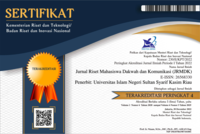Author Guidelines
INSTRUCTIONS FOR AUTHORS
- The article submitted has never been published and is not being sent to other journals.
- Article written for Jurnal Riset Mahasiswa Dakwah dan Komunikasi (JRMDK) includes an article on research results in the field of da'wah and communication.
- Article length 5,000 - 8,000 words.
- The article is written in English. The article’s writing adjusts the Author Guidelines.
- All texts are reviewed anonymously by double-blind review appointed by the editor based on their expertise. The article writer must revise the manuscript based on recommendations/suggestions from reviewers and/or editors.
- Systematic articles of research results are title, author's name (accompanied by institutional address and e-mail address), abstract (accompanied by keywords), introduction, methods, results and discussion, conclusions, and references.
Title
The title of the article is no more than 12 words.
Name of the author
The name of the author in the article is listed without an academic degree, accompanied by the name of the institution, and e-mail of the author, placed under the title of the article. If the manuscript is written by more than one person, the e-mails listed are only the e-mail of the main author (correspondence author).
Abstract and keywords
Abstracts and keywords are written in Bahasa Indonesia or English. Abstract 100-150 words long, accompanied by 3-5 words keywords. The abstract at least contains goals, methods, and results.
Introduction
The introduction to the research article contains the background, research context, results of the literature review, and research objectives. All introductory parts are integrated presented in the form of paragraphs.
Method
The method section contains paragraphs about the research design, data sources, data collection techniques, and data analysis.
Result and Discussion
The result and discussion section contains an explanation of the results of the analysis relating to the research objectives. The discussion contains an analysis of the results and a discussion of theories and similar research results.
Conclusion
The conclusion section contains answers to the writing objective and is presented in paragraph form rather than bullet points.
References
- The reference list only contains the sources referenced in the article, and all sources referenced must be listed in the reference list.
- Reference sources for articles from empirical research are at least 30 references. At least 70% of the total references used are primary sources in the form of research articles in journals, especially from Sinta-accredited journals and reputable international journals. At least 80% of references are published within 10 years.
- Reference sources for literature study articles are at least 70 references. At least 70% of the total references used are primary sources in the form of articles from Sinta-accredited journals and reputable international journals. At least 80% of references are published within 10 years. The main considerations for the acceptance of literature study articles are the strength of scientific dialogue, the sharpness of the synthesis, and the theoretical contribution.
- Reference and quotation using the APA Style 6th edition reference technique. Examples of the inclusion of sources in the direct quote are accompanied by information about the page number where the citation came from. Example: Prell (2013: 90) or (Prell, 2013: 90)
- The reference list is recommended using reference management tools (Zotero, Mendeley, and others). The reference list is arranged alphabetically referring to APA Style 6th edition. Example:
Book with a single author
Eriyanto (2014). Analisis Jaringan Komunikasi. Jakarta: Prenada Media Group
Prell, C. (2013). Social Network Analysis: History, Theory & Methodology. London: Sage Publications.
Book with two to seven authors
Hamilton, J. M., & Krimsky, G.A. (1996). Hold the press: The inside story on newspapers. Baton Rouge: Louisiana State University Press.
Wong, D. L., Hockenberry-Eaton, M., Wilson, D., Winkelstein, M. L., Ahmann, E., & DiVito-Thomas, P. A. (1999). Whaley & Wong's nursing care of infants and children (6th ed.). St. Louis: Mosby.
E-book:
Gray, J., Bounegru, L., & Chambers, L. (2012). The Data Journalism Handbook. Sebastopol, CA: O’Reilly Media. Tersedia dari http://datajournalismhandbook.org/1.0/en/
Article in the collection of articles book:
Pontoh, C. H. (2013). Konflik Tak Kunjung Padam. Dalam Triharyanto, B. & Salam, F. (Eds), Dapur Media: Antologi Liputan Media di Indonesia (h. 43-93). Jakarta: Pantau.
Bergquist, J. M. (1992). German Americans. In J. D. Buenker & L. A. Ratner (Eds.), Multiculturalism in the United States: A comparative guide to acculturation and ethnicity (pp. 53-76). New York, NY: Greenwood.
Journal:
Brady, D., & Webb, N. (2013). Communicating bushfire safety in Australia: the challenge for government of increasing community participation. Asia Pacific media educator, 23(2), 351-365.
Journal with DOI:
Knight, M. (2015). Data Journalism in the UK: A Preliminary Analysis of Form and Content. Journal of Media Practice 16 (1): 55-72. DOI: 10.1080/14682753.2015.1015801.
Conference Article (Proceedings)
Jongeling, S. B. (1988, September). Student teachers’ preference for cooperative small group teaching. Paper Presented at The 3rd Annual 13 Research Forum of the Western Australian Institute for Educational Research, Murdoch University, Murdoch, Western Australia.
Article from the Internet:
Massy, W. F. & Robert, Z. (1996). Using Information Technology to Enhance Academic Productivity. Retrieved from: (www.educom.edu/program.nlii/keydoces/massy.htm)
Article from Newspaper:
Iskandar, A. (2017, Desember 28). Sumber Energi Peredaran Gelap Narkotika di Indonesia. Media Indonesia, hal. 8.
Newspaper article without an author:
Perlu Kearifan Memanfaatkan Teknologi. (2017, Desember 28). Riau Pos, hal. 17.
Article from Online Media:
Kasali, R. (2017, Desember 28). Arah Tranformasi dan "Digital Crisis" 2018. Kompas. Retrieved from: http://ekonomi.kompas.com/read/2017/12/28/070000926/arah-tranformasi-dan-digital-crisis-2018
Official Document:
Badan Pusat Statistik Provinsi Riau. (2017). Provinsi Riau Dalam Angka 2017. Pekanbaru: Badan Pusat Statistik Provinsi Riau.
Thesis, Dissertation and Research Report:
Muchlis, F. (2017). Praktik Komunikasi dalam Pemberdayaan Orang Rimba di Taman Nasional Bukit Duabelas Provinsi Jambi. (Disertasi tidak diterbitkan). Institut Pertanian Bogor, Bogor, Indonesia.
Website:
Data Driven Journalism. (2017). Retrieved from:: http://datadrivenjournalism.net/
Blog:
Rogers, s. (2015, June 28). Data journalism in China. [Web log post] https://simonrogers.net/2015/06/28/data-journalism-in-china/








.png)




